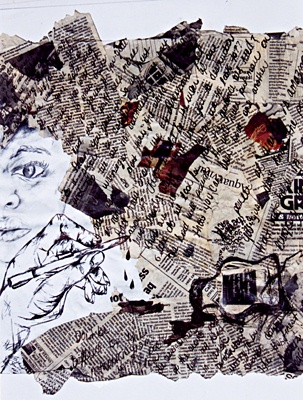All Nonfiction
- Bullying
- Books
- Academic
- Author Interviews
- Celebrity interviews
- College Articles
- College Essays
- Educator of the Year
- Heroes
- Interviews
- Memoir
- Personal Experience
- Sports
- Travel & Culture
All Opinions
- Bullying
- Current Events / Politics
- Discrimination
- Drugs / Alcohol / Smoking
- Entertainment / Celebrities
- Environment
- Love / Relationships
- Movies / Music / TV
- Pop Culture / Trends
- School / College
- Social Issues / Civics
- Spirituality / Religion
- Sports / Hobbies
All Hot Topics
- Bullying
- Community Service
- Environment
- Health
- Letters to the Editor
- Pride & Prejudice
- What Matters
- Back
Summer Guide
- Program Links
- Program Reviews
- Back
College Guide
- College Links
- College Reviews
- College Essays
- College Articles
- Back
Analysis of Martin Luther King's Letters to the Birmingham Jail
In Martin Luther King’s letters written in a Birmingham jail, he uses Aristotelian appeals to 8 clergymen by addressing ethos, logos, and pathos in order to move the people of America. King takes a crucial step to change the minds of these clergymen as well as America by breaking down what they stand for into individualized pieces, calling to their ethos, their morality. Although both logos and pathos are prominent in his letter, Ethos has the greatest impact. King understands the makeup of these men, being a “fellow clergymen and christian brother” himself. By beginning his letter with a strong sense of ethos, “I feel that you are all men of genuine good will”, he guaranteed the attention from the clergymen. He makes references to the most important figures of history, such as “Apostle Paul” and speaks of how he “carried the gospel for Jesus” and Socrates, and how he “Made a tension in the mind” that deciphers the truth from the false. King uses those examples as subliminal traps for both the clergymen’s and the rest of america’s attention. Not only does King appeal to the use of ethos directly, he also appeals to ethos indirectly hidden inside extensive paragraphs of logic. He states “Jesus was an extremist for love, truth, and goodness” in the midst of a long statement of logic, molding the ethos into his logos, hinting towards a higher power any time he receives the opportunity. Although he uses ethos to draw the greatest minds as positive characters in his argument, he also uses a negative ethos to appeal to a higher, but worse, power. Within his explanation of laws that defy our morals are references to Adolf Hitler. Even though Adolf did things that defied basic decency and morality, everything he “did in Germany was legal.”, but in contrast to that, King states that everything Hungarian Freedom Fighters “did in Hungary was illegal” although they fought for the greater good. As King proceeds with his letter, he refers to the clergymen as his “Christian and Jewish brothers” and his “fellow” man. King tries to form a relation between them using his ethos in relation to theirs, and tries to not downgrade the attacking argument, but instead, counter arguing their ideas respectfully. The clergymen referred to King as an “extremist”, and King proceeded to list names of historical figures of high respectability who were all extremists. He refers to Paul, “Extremist for Christian gospel”, Amos, “extremist for justice”, and many other inspirational figures of history, using hypophora to add emphasis. He takes the clergymen’s counterarguments, tears them down, and rebuilds them to work on his behalf in a way where he can entirely contradict or expand on each argument. He conjoins the blacks and whites and relates them with his idea on good morals. He builds relation to these clergymen and by doing this he proves a point that blacks and whites aren't so different after all, using ethos to enforce this. If blacks were to be freed, King states that it would be because of “sacred heritage of our nation and eternal will of god” Making it so that it would be a positive reform for the nation, and the “will of god”. The will of god; the will that the majority of human beings will follow and the foundation of each religion involving a god. God’s will has the power to move strong Christians with stiff ideas.

Similar Articles
JOIN THE DISCUSSION
This article has 0 comments.
